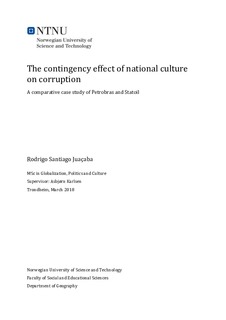| dc.contributor.advisor | Karlsen, Asbjørn | |
| dc.contributor.author | Santiago Juaçaba, Rodrigo | |
| dc.date.accessioned | 2018-07-31T08:00:07Z | |
| dc.date.available | 2018-07-31T08:00:07Z | |
| dc.date.issued | 2018 | |
| dc.identifier.uri | http://hdl.handle.net/11250/2506920 | |
| dc.description.abstract | Petrobras and Statoil have long been regarded as role models for other NOCs in terms of managerial practices, transparency, efficiency and value creation. Nevertheless, both companies have experienced corruption in the past decades. This study compares two cases - Operation Car Wash and Statoil-Horton scandal - in order to investigate the cause of a remarkable contrast between the levels of corruption observed in these companies. Literature review of both theoretical and empirical research is performed, with focus on the role of national culture as a contingency factor and its relationship to corruption. The findings point that national culture plays an important contextual role in causing corruption. Moreover, the composition of the companies' board of directors is also found to be a key factor. By challenging the notion of a universal solution for corruption, this study suggests that national culture must be taken into account by policymakers in order to effectively combat it. | nb_NO |
| dc.language.iso | eng | nb_NO |
| dc.publisher | NTNU | nb_NO |
| dc.subject | Petrobras | nb_NO |
| dc.subject | Statoil | nb_NO |
| dc.subject | national culture | nb_NO |
| dc.subject | corruption | nb_NO |
| dc.subject | Brazil | nb_NO |
| dc.subject | Norway | nb_NO |
| dc.title | The Contingency effect of national culture on corruption : a comparative case study of Petrobras and Statoil | nb_NO |
| dc.type | Master thesis | nb_NO |
| dc.subject.nsi | VDP::Samfunnsvitenskap: 200::Samfunnsgeografi: 290 | nb_NO |
